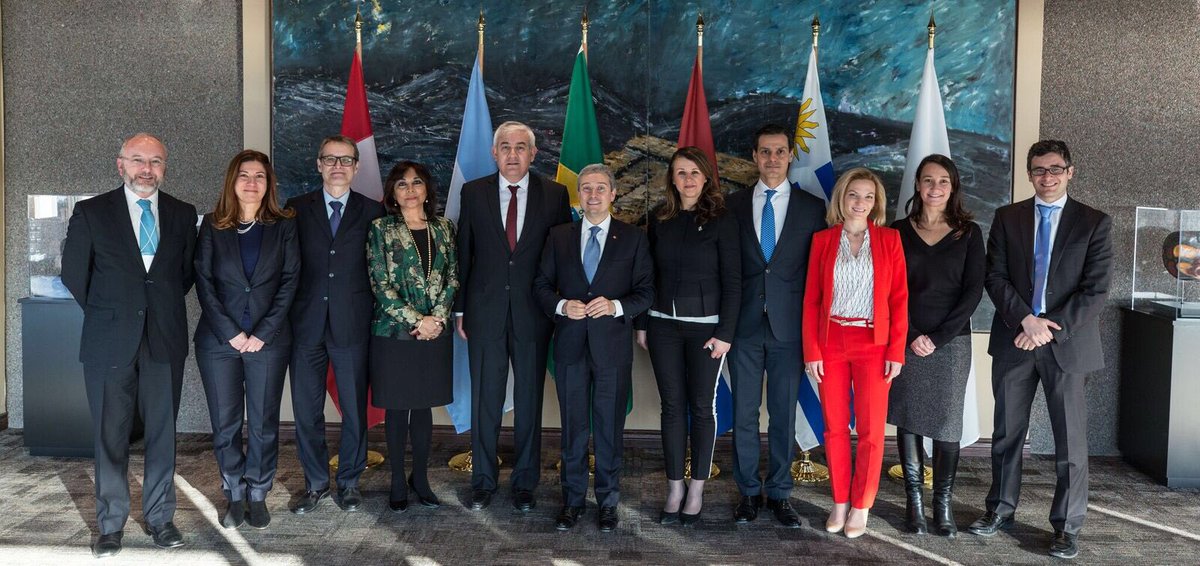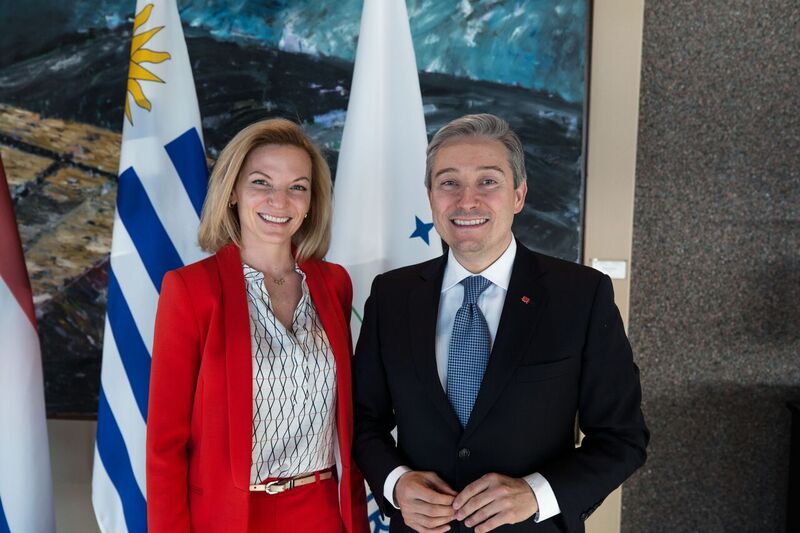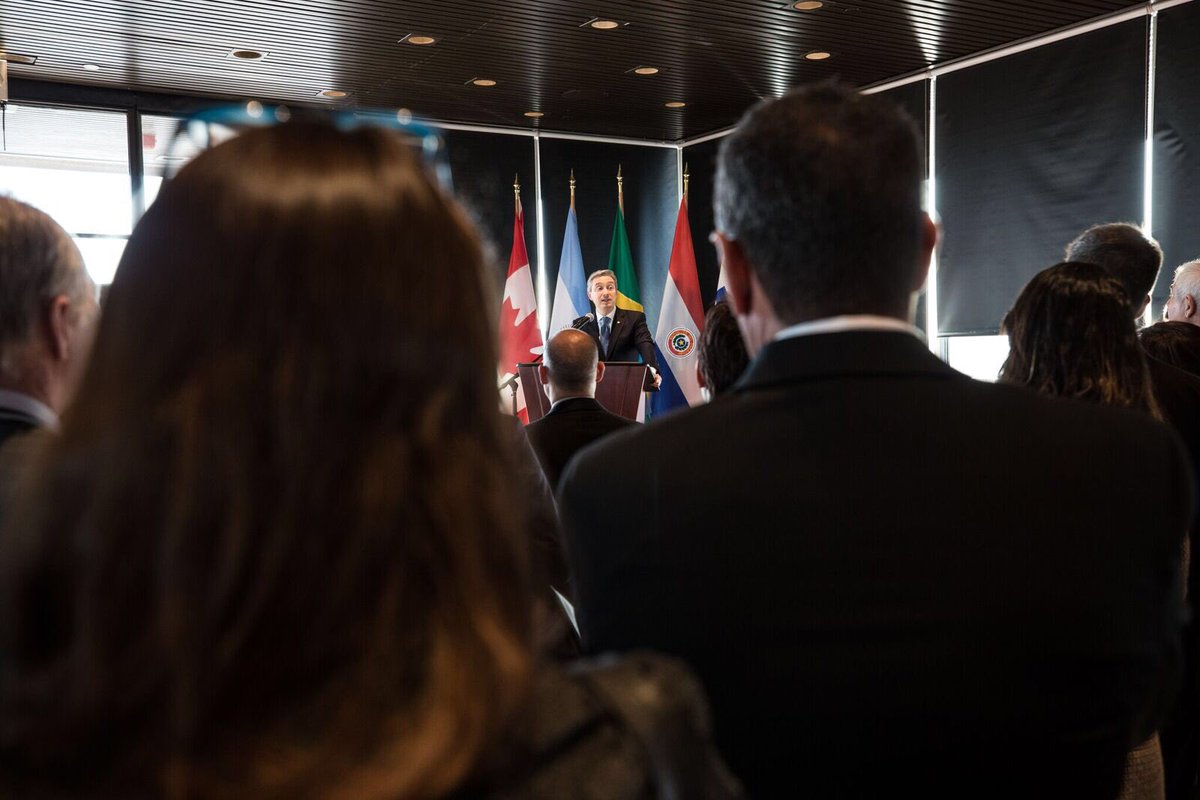CANADA - MERCOSUR
Global Affairs Canada. March 20, 2018. Minister of International Trade welcomes first round of negotiations with Mercosur countries in Ottawa
Ottawa, Ontario - International trade is a key driver of economic growth, contributing to a prosperous middle class. Expanding and diversifying Canada’s trade with large, fast-growing markets such as Mercosur – a trading bloc comprised of Argentina, Brazil, Paraguay and Uruguay – is a priority for the Government of Canada and a key part of its progressive trade agenda and diversification strategy.
Following the announcement made on March 9, 2018 in Asuncion, Paraguay, to launch negotiations toward a comprehensive Canada-Mercosur free trade agreement (FTA), the Honourable François-Philippe Champagne, Minister of International Trade, is pleased to welcome the first round of formal negotiations in Ottawa from March 20 to 23, 2018.
Preferential access to this market has the potential to create more opportunities for world-class Canadian goods and services, and provide Canadian consumers and businesses enhanced access to goods and services from Mercosur countries. For example, a comprehensive and ambitious FTA with Mercosur could reduce the tariffs of up to 35% that currently apply to Canadian forestry, automotive and chemical-plastic products.
The Government of Canada is committed to advancing a progressive trade agenda, in recognition that trade policies need to respond and contribute meaningfully to overall economic, social and environmental priorities. As a part of the Mercosur negotiations, Canada is committed to expanding the impact-assessment process beyond the environment to include, for example, labour and gender considerations.
Quotes
“The Government of Canada is committed to ensuring that a Canada-Mercosur trade agreement will include provisions aimed at sharing the benefits of trade among all, including women, youth, Indigenous people, small and medium-sized enterprises, and the middle class.”
- François-Philippe Champagne, Minister of International Trade
Quick facts
- In 2017, Canada and Mercosur exchanged $8.9 billion in trade.
- Mercosur accounts for more than two-thirds of all economic activity in South America.
- With a combined population of 260 million and a GDP of over $3 trillion, Mercosur is the world’s fourth-largest trading bloc.
- The South American trade bloc of Mercosur is a customs union established by Argentina, Brazil, Paraguay and Uruguay in 1991.
On March 19, 2018 The Honourable François-Philippe Champagne, Minister of International Trade, will greet Ambassador Martin Vidal Delgado of Uruguay, Ambassador Inés Martínez Valinotti of Paraguay, Chargé d’affaires Sebastian J. Palou of Argentina and Acting Head of Mission Maria Elisa Maia of Brazil at a reception on the evening in Ottawa. This marks the beginning of the first round of negotiations toward a possible free trade agreement with Mercosur countries.




Global Affairs Canada. March 9, 2018. Joint statement on the launch of negotiations toward a comprehensive free trade agreement between Canada and the Mercosur member states
Asunción, Paraguay - Ministers of the Mercosur member states, Jorge Marcelo Faurie, Argentina’s Minister of Foreign Affairs and Worship; Aloysio Nunes Ferreira, Brazil’s Minister of Foreign Affairs; Marcos Jorge de Lima, Brazil’s Minister of Industry, Foreign Trade and Services; Eladio Loizaga, Paraguay’s Minister of Foreign Affairs; and Rodolfo Nin Novoa, Uruguay’s Minister of Foreign Affairs, met with the Honourable François-Philippe Champagne Canada’s Minister of International Trade, on March 9, 2018, in Asunción.
At the conclusion of their meeting, the ministers agreed as follows:
Joint statement on the launch of negotiations toward a comprehensive free trade agreement between the Mercosur member states and Canada
The ministers agreed to launch negotiations toward a comprehensive Canada-Mercosur free trade agreement (FTA). This represents a significant step toward deepening the important relationship between the Mercosur member states and Canada.
The ministers underscored the opportunity a comprehensive, progressive and commercially meaningful FTA presents for the mutual benefit of Canada and Mercosur. Strengthening ties through enhanced trade and investment flows is an integral step toward a shared interest in sustainable prosperity and a shared commitment to trade liberalization and open markets.
The ministers recognized the importance of advancing this initiative in an inclusive manner. Mercosur and Canada will seek to negotiate issues such as market access for goods and services, labour, the environment, trade and gender, micro-, small and medium-sized enterprises, among others. Integrating these elements will reinforce a collective commitment to lasting economic growth and development for all people.
The ministers committed to pursue negotiations of an FTA in order to bring opportunities to the people of Canada and Mercosur without delay and have instructed officials to hold the first round of negotiations in Ottawa, Canada, from March 20 to 23, 2018.
Global Affairs Canada. February 23, 2018. Minister Champagne announces positive conclusions of exploratory talks with Mercosur
Ottawa, Ontario - Canada is committed to a progressive and diversified trade agenda that puts the interests of middle-class Canadians front and centre. More trade means growth, and growth means more jobs, which is why the government continues to explore new opportunities to negotiate free trade agreements with fast-growing global markets.
The Honourable François-Philippe Champagne, Minister of International Trade, is pleased to announce the positive conclusion of the exploratory discussions on a comprehensive free trade agreement with Mercosur trade bloc, which consists of Argentina, Brazil, Paraguay and Uruguay.
This outcome builds on the Canada–Mercosur joint statement, which confirmed the intent to deepen the trade relationship, issued on the margins of the World Trade Organization meetings held in Marrakesh, Morocco, in October 2017.
As the world’s fourth-largest trading bloc and with a population of 260 million and a combined GDP of over $3 trillion, Mercosur offers Canadian companies opportunities to access these large fast-growing markets with the potential to increase well-paying, middle-class jobs at home. From auto parts to chemicals to lumber to seafood, this important market is ripe for Canadian products and for the workers who produce them. A comprehensive free trade agreement with Mercosur also has the potential to reduce tariffs on many of Mercosur’s exports to Canada—benefiting Canadian customers looking for more choices at more affordable prices, such as apparel or furniture.
Should Canada and Mercosur launch comprehensive negotiations, the Government of Canada will remain committed to a progressive trade agenda, one that creates more opportunities for everyone, including women and Indigenous peoples.
Quotes
“Canada recognizes the enormous opportunities Mercosur represents to diversify markets, create more jobs at home and pave the way for Canadians to compete and win across the Americas.”
- François-Philippe Champagne, Minister of International Trade
- The South American trade bloc Mercosur is a customs union established by Argentina, Brazil, Paraguay and Uruguay in 1991.
- In 2016, the four members of Mercosur had a combined GDP of $3.2 trillion and a population of 260 million people.
- Mercosur accounts for more than two thirds of the total economic activity in South America.
- In 2016, bilateral merchandise trade between Canada and Mercosur reached a value of $8.9 billion.
Mercosur trade bloc - Benefits for Canada
Expanding Canada’s trade with large fast-growing markets, such as Mercosur, is a priority for the Government of Canada and contributes to its trade diversification strategy. The government’s objectives are to increase the country’s prosperity through creating more opportunities for more Canadians to pursue new markets, compete and win. The strategy also provides Canadians with a greater choice of affordable products, raises living standards in the process and creates well-paying jobs for the middle class.
With a combined population of 260 million and GDP of over $3 trillion, Mercosur—the South American trading bloc composed of Argentina, Brazil, Paraguay and Uruguay—offers Canada an opportunity to deliver on its ambitious trade agenda with large and like-minded fast-growing markets. Opportunities abound to increase our current $8.9 billion in bilateral trade, which will help to create more jobs in Canada. This includes opportunities for micro, small and medium-sized enterprises (MSMEs), which will benefit by having increased access to markets to sell their world-class products.
Trade diversification
As a key part of Canada's trade diversification agenda, a free trade agreement with Mercosur would mean that 85% of Canada's trade is now covered by trade agreements with countries that account for 66% of all global economic activity.
In combination with Canada’s existing free trade agreements, an agreement between Canada and Mercosur would enable 98% of Canada's current trade with South America to benefit from preferential access, making Canada the hemisphere's most open and privileged trading partner.
Opportunities by sector
As the world’s fourth-largest trading bloc, Mercosur presents significant commercial opportunities for Canadian companies and workers in sectors across the country—from British Columbia’s lumber and Ontario’s auto parts and chemicals products to Quebec’s aerospace sector and the Atlantic provinces’ fisheries. This important market is ripe for Canadian products and for the specialized know-how of the workers who produce them.
A comprehensive and ambitious outcome in a free trade agreement with Mercosur would enhance market access for Canadian world-class goods, creating more opportunities for established and first-time exporters to tap a rapidly growing market and generating new jobs at home.
For example, market access, in the form of reduced tariffs, could be enhanced for Canadian exporters in a number of industrial sectors, including:
- automobiles and parts (current tariffs up to 35%)
- chemicals and plastics (current tariffs up to 18%)
- pharmaceuticals (current tariffs up to 14%)
- aluminum (current tariffs up to 16%)
- machinery and equipment (current tariffs up to 20%)
- information and telecommunications technology (current tariffs up to 20%)
- scientific instruments (current tariffs up to 18%)
- forestry sector (current tariffs up to 16%).
Opportunities also exist for services suppliers in sectors where Canadians excel, such as in infrastructure, distribution and logistics; transportation; tourism and travel-related services; as well as services linked to the extractive industries.
Benefits for consumers
A comprehensive and ambitious outcome in a free trade agreement with Mercosur also has the potential to reduce high tariffs on many of Mercosur’s exports to Canada. This will benefit Canadian customers looking for more choices at more affordable prices. Some of these include key benefits for every Canadian workers and their families in areas where high tariffs are currently applied, such as in the apparel, footwear and furniture sectors.
Canada’s progressive trade agenda
A Canada-Mercosur free trade agreement would be a strategic opportunity for Canada to advance its progressive trade agenda in an important and growing region. Mercosur member countries are willing partners in the pursuit of tangible progressive trade elements, such as in the areas of gender, MSMEs, environment and labour, as part of these negotiations.
As part of the its commitment to transparency and openness, the government has spent the past year listening to a broad range of Canadians, including representatives of industry and business organizations, Indigenous groups, labour unions, civil society groups, environmental groups and Crown corporations, as they share their views on strengthening trade relations with Mercosur. While the consultation period in the Canada Gazette is over, officials continue to accept views and submissions from Canadians on this initiative and discussions continue coast to coast to coast on opening more doors for Canadians.
Potential benefits of a Canada-Mercosur free trade agreement for Canadian sectors
Forestry sector
What could a free trade agreement with Mercosur mean for Canada’s forestry sector?
Canada’s forestry sector is a major source of wealth for Canadians, and the Government of Canada is actively exploring new opportunities to develop markets for Canadian wood and wood products.
- In 2016, Canada’s forestry sector contributed close to $21.6 billion to Canada’s GDP and employed about 210,000 Canadians, including many in highly skilled jobs.
- Canada is one of the world’s largest lumber producers and its largest lumber exporter.
- By value, Canada is both the world’s leading exporter of newsprint and third-largest exporter of wood pulp.
A comprehensive and ambitious FTA with Mercosur could enhance market access for Canadian world-class goods, creating more opportunities for established and first-time exporters to tap a rapidly growing market while creating new jobs at home.
- In 2017, Canada exported $111.5-million worth of forestry products to Mercosur countries.
- A comprehensive and ambitious FTA with Mercosur could reduce tariffs on Canada’s forestry exports from up to 35%.
- That means exporters of Christmas trees, newsprint and wood pulp from British Columbia, New Brunswick, Ontario and Quebec could find new, more accessible markets for their products, and thus expand their businesses at home.
Automotive sector
What could a free trade agreement with Mercosur mean for Canada’s automotive sector?
The automotive sector is one of Canada’s largest manufacturing sectors. Its skilled workforce combined with deep expertise position Canada to play a leadership role as the industry evolves.
- In 2016, the automotive sector contributed more than $103 billion in factory shipments to, or about 11% of, Canada’s manufacturing GDP.
- The sector contributes to 126,000 jobs across Canada, with 84% of those jobs in Ontario, 6% in Quebec, 4% in Western Canada and 6% in Atlantic Canada.
- Canada is the world’s tenth-largest vehicle-producing nation.
- The motor vehicle industry is Canada’s largest manufacturing sector.
A comprehensive and ambitious FTA with Mercosur could enhance market access for Canadian world-class goods, creating more opportunities for established and first-time exporters to tap a rapidly growing market while generating new jobs at home.
- In 2017, Canada exported $18.9-million worth of automotive products to Mercosur countries.
- A comprehensive and ambitious FTA with Mercosur could reduce tariffs on Canada’s automotive exports by up to 35%.
- While the vast majority of Canada’s automotive and auto parts production is for export to the U.S. market, an FTA with Mercosur could support diversification by providing access to new markets in the Americas.
Fish and seafood sector
What could a free trade agreement with Mercosur mean for Canada’s fish and seafood sector?
The fish and seafood industry is a vital part of Canada’s economy and communities, and helps to create jobs in coastal cities and towns.
- Fish and seafood are among Canada’s largest exports of food products. In 2017, Canada exported $7-billion worth of fish and seafood products.
- In 2017, the fish and seafood industry contributed nearly $2.1 billion to the Canadian economy in 2017 and employed an estimated 112,300 Canadians.
- In 2016, Canada was the world’s eighth-largest exporter of fish and seafood products.
A comprehensive and ambitious FTA with Mercosur could enhance market access for Canadian world-class goods, creating more opportunities for established and first-time exporters to tap a rapidly growing market while generating new jobs at home.
- In 2017, Canada exported $3-million worth of fish and seafood products to Mercosur countries, demonstrating that there are tremendous opportunities for growth in a market of more than 260 million customers.
- Reduced tariffs could enhance market access for Canadian fish and seafood exports, which currently face tariffs of up to 32%.
Industrial goods sector
What could an FTA with Mercosur mean for Canada’s industrial goods?
A comprehensive and ambitious FTA with Mercosur could enhance market access for Canadian world-class goods, creating more opportunities for established and first-time exporters to tap a rapidly growing market while generating new jobs at home.
Tariff elimination on industrial goods could be wide-ranging, covering a variety of key Canadian export sectors, including:
- Chemical and plastic products
- Medical goods and pharmaceuticals (life sciences)
- Aluminum
- Industrial machinery
- Information and communications technology
Backgrounder
Canada and the Mercosur member states—Argentina, Brazil, Paraguay and Uruguay—have agreed on the strong potential to develop a more ambitious trade relationship by enhancing trade and investment flows through a comprehensive free trade agreement.
In concluding exploratory discussions, Canada and Mercosur concurred that, if they were in agreement to launch comprehensive negotiations, the outcome of negotiations would have to be commercially meaningful, mutually beneficial and balanced.
Both Parties also expressed their interest to include provisions that contribute to broader economic, social and environmental policy priorities, reflecting the objective of allowing for larger participation of civil societies in the shaping of and following up on the agreement.
Canada and Mercosur also agreed on the overall framework of negotiations, such as the timing for a potential first meeting, alternating rounds between Mercosur countries and Canada, and the appointment of spokespersons. The following is the agreed outline for negotiations, with other issues to be added as appropriate:
- Trade in goods
- Rules of origin
- Origin procedures
- Trade facilitation and customs cooperation
- Trade remedies
- Sanitary and phytosanitary measures
- Technical barriers to trade
- Trade in services
- Cross-border trade in services
- Financial services
- Temporary entry
- Telecommunications
- Investment
- Intellectual property rights
- Competition policy and public and private market participants
- Government procurement
- Inclusive trade
- Environment
- Labour
- Micro, small and medium-sized enterprises
- Trade and gender
- Electronic commerce
- Horizontal, legal and institutional provisions (including dispute settlement)
The messages received from Canadians indicate general support for the initiative, noting market expansion opportunities for Canadian businesses in this thriving region, as well as opportunities to address existing non-tariff trade barriers.
FULL DOCUMENT: http://international.gc.ca/trade-commerce/trade-agreements-accords-commerciaux/agr-acc/mercosur/sectors-secteurs.aspx?lang=eng
See also
- Canada-Mercosur Free Trade Agreement: https://international.gc.ca/trade-commerce/trade-agreements-accords-commerciaux/agr-acc/mercosur/index.aspx?lang=eng
________________
LGCJ.: